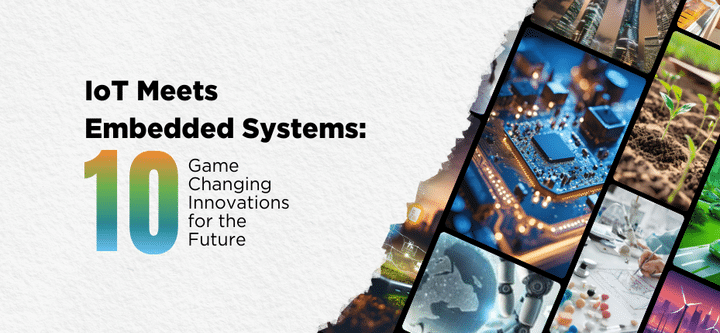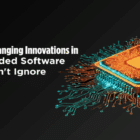The integration of IoT and embedded systems is creating an interconnected world, where devices and systems work seamlessly together to enhance efficiency and productivity. These technologies allow for real-time data collection, decision-making, and automation, enabling businesses to operate smarter and faster. From healthcare to manufacturing, IoT and embedded systems are empowering industries to innovate, reduce costs, and improve customer experiences.
As more devices become interconnected, the potential for automation and data-driven decision-making grows exponentially. This revolution is not limited to large corporations; even small businesses are leveraging IoT solutions to streamline operations, reduce waste, and increase scalability. The ability to monitor and control systems remotely is opening doors to unprecedented convenience and control, which was once unimaginable.
With the global IoT market projected to reach $1.6 trillion by 2025, the adoption of these technologies is accelerating. As IoT and embedded systems continue to evolve, their influence on connectivity and automation will shape a future where virtually everything is interconnected, improving efficiency and creating new opportunities for growth and development across sectors.
What are IoT and Embedded Systems?
IoT (Internet of Things) refers to a network of interconnected devices that communicate, collect, and exchange data without human intervention. It allows for real-time decision-making, seamless automation, and connectivity across industries. In contrast, Embedded Systems are specialized computing systems designed to perform dedicated functions within larger systems, serving as the backbone of many IoT applications.
When combined, IoT and embedded systems create intelligent and autonomous solutions that power diverse applications in industries like healthcare, manufacturing, and smart cities. This integration fosters innovation and enhances operational efficiency, redefining the future of connectivity and automation.
The transformative potential of these technologies is evident in their projected growth. Statista forecasts the proliferation of 75 billion IoT devices by 2025, reflecting an unprecedented expansion in connected technologies.
McKinsey’s April 2024 report highlights that IoT could contribute a staggering $11 trillion to the global economy by 2030, underscoring its economic significance. Additionally, the 2024 World Economic Forum study predicts that IoT will create 23 million jobs globally by 2030, cementing its role as a driver of economic and employment growth.
The integration of IoT and embedded systems is not just a technological advancement—it represents a profound shift in how industries and societies function, paving the way for a more connected, efficient, and innovative future.
Benefits of IoT and Embedded Systems
IoT and embedded systems are revolutionizing industries by enhancing automation, efficiency, and connectivity. These technologies bring transformative benefits that optimize operations and enable smarter, more sustainable solutions across various sectors.
1. Enhanced Automation:
IoT and embedded systems automate repetitive tasks, reducing the need for human involvement. This boosts efficiency by allowing machines to handle tasks like data collection and workflow management, minimizing errors and improving productivity.
2. Real-time Monitoring:
With continuous data capture, IoT systems enable real-time monitoring of operations. Instant access to data helps businesses make quick decisions, improving responsiveness and performance in industries like healthcare, manufacturing, and agriculture.
3. Energy Efficiency:
IoT devices help monitor and optimize energy consumption. By adjusting resource use based on real-time data, these systems reduce energy waste, lower costs, and promote sustainability in various industries.
4. Scalability:
IoT and embedded systems are designed to be scalable, allowing businesses to expand by adding new devices or upgrading existing ones. This modularity ensures smooth growth and adaptability without major system overhauls.
How IoT and Embedded Systems Will Transform the Future
The integration of IoT and Embedded Systems is driving a technological revolution, setting the stage for smarter, more efficient industries and societies. These technologies are not just incremental improvements; they are redefining the way we interact with the world, creating opportunities for enhanced automation, connectivity, and data-driven decision-making.
The transformative potential of IoT and Embedded Systems extends far beyond these examples. From autonomous vehicles to personalized retail experiences, these technologies are reshaping the future of connectivity and automation. The following section explores ten specific ways in which IoT and embedded systems are driving this change, showcasing their profound impact across various domains.
1. Smart Cities: Building Tomorrow Today
IoT and embedded systems are foundational in the development of smart cities. These technologies enhance traffic management, waste management, and energy distribution for optimized urban living. McKinsey’s June 2024 report predicts that IoT-powered smart cities could cut energy costs by up to 25% annually. With interconnected infrastructure, cities can become more efficient, sustainable, and livable, benefiting citizens and reducing environmental impact.
2. Healthcare Revolution: Precision Meets Proactivity
IoT-driven embedded systems are revolutionizing healthcare by improving both preventive and diagnostic capabilities. From wearable health devices to remote monitoring systems, these technologies provide real-time data to healthcare providers, enabling more accurate treatments. Deloitte’s 2024 report estimates that IoT in healthcare will grow at a 24% CAGR, facilitating innovations like connected insulin pumps and heart monitors, which lead to better patient outcomes and cost-effective care.
3. Manufacturing Renaissance: Industry 4.0
At the core of Industry 4.0, IoT and embedded systems power smart manufacturing processes such as predictive maintenance, automated quality checks, and advanced supply chain management. These systems ensure higher efficiency and lower downtime, boosting overall production capabilities. Evolute’s IoT-enabled solutions demonstrate how these technologies transform the manufacturing sector, leading to increased operational excellence and reduced costs.
4. Smart Homes: Living the Future
IoT and embedded systems are reshaping the way we live by integrating smart devices into homes. Smart thermostats, lighting systems, and security cameras enhance convenience, security, and energy efficiency. According to Gartner’s January 2024 report, smart home adoption is expected to reach 60% of global households by 2025, reflecting growing consumer demand for connected, automated living environments that reduce costs and increase comfort.
5. Transportation Transformation: Mobility Redefined
IoT and embedded systems are driving a transportation revolution, particularly through autonomous vehicles and intelligent transport systems. These technologies enable safer, more efficient transportation networks. Forbes’ 2024 study suggests that self-driving cars could reduce road accidents by up to 90%, leading to a safer and more sustainable transportation future. IoT’s ability to enable vehicle communication with infrastructure further improves traffic flow and reduces congestion.
6. Agriculture: Sowing Seeds of Innovation
IoT and embedded systems are transforming agriculture through smart farming solutions like optimized irrigation, real-time crop monitoring, and efficient pest control. These technologies ensure resources are used more effectively, improving yields and reducing waste. The UN’s February 2024 report states that IoT applications could increase agricultural productivity by up to 70% by 2050, supporting food security and sustainability in the face of growing global demand.
7. Energy Management: Powering Sustainability
Smart grids and energy-efficient solutions powered by IoT and embedded systems are reshaping the energy sector. By enabling real-time monitoring and optimization of energy usage, these technologies reduce waste and promote sustainability. Evolute’s cleantech innovations, such as smart energy storage and battery packs, demonstrate how IoT can help in managing energy resources efficiently, contributing to a cleaner, more sustainable future.
8. Retail Revolution: Personalized Shopping
IoT is revolutionizing the retail industry by enabling smarter inventory management, personalized shopping experiences, and better customer engagement. Retailers can use IoT to track customer preferences and provide real-time, tailored offers. According to PwC’s 2024 insights, IoT adoption in retail is expected to improve operational efficiency by 30%, enhancing the customer experience while optimizing supply chains and inventory systems.
9. Enhanced Security: Safeguarding the Future
IoT-enabled embedded systems are critical in bolstering security through real-time threat detection and mitigation. With IoT sensors and biometric authentication devices, organizations can monitor potential threats and take immediate action. Evolute’s biometric solutions provide secure identity management, offering enhanced protection for sensitive data and systems. As cybersecurity risks grow, these systems ensure that security measures remain effective and adaptive.
10. Environmental Monitoring: Protecting the Planet
IoT-driven embedded systems play a crucial role in environmental conservation by enabling real-time monitoring of air quality, water usage, and pollution levels. These systems can help track and reduce carbon footprints, supporting global sustainability goals. The UN’s March 2024 survey suggests that these technologies could reduce global emissions by 15% by 2030, underscoring their potential to help mitigate the effects of climate change and improve environmental stewardship.
How Evolute Leverages IoT and Embedded Systems
Evolute is at the forefront of integrating IoT and Embedded Systems, delivering transformative solutions that revolutionize industries. In the fintech sector, Evolute has developed innovative devices such as Micro ATMs and POS terminals that facilitate seamless digital transactions. These IoT-powered solutions ensure secure, real-time operations, fostering financial inclusion and enhancing user experiences.
Evolute’s embedded systems provide scalability and adaptability, catering to emerging trends like contactless payments and biometric authentication, thus aligning with the evolving needs of the digital economy.In the cleantech and manufacturing domains, Evolute drives sustainability and innovation through smart battery systems and advanced manufacturing services.
These battery systems, tailored for EVs and industrial applications, leverage IoT-enabled monitoring and optimization to enhance energy efficiency and performance. Meanwhile, Evolute’s Electronics Manufacturing Services (EMS) and Original Design Manufacturing (ODM) incorporate IoT-driven processes, including predictive maintenance and real-time quality control. This integration of IoT and embedded systems into production workflows ensures high-quality, scalable solutions, empowering businesses to meet modern demands with precision and efficiency.
Conclusion: The Journey of Limitless Future
IoT and embedded systems are not just technological advancements; they are the building blocks for a smarter, more sustainable, and interconnected world.
As industries across the globe adopt these innovations, the potential for growth, efficiency, and societal impact is boundless. From healthcare to agriculture, these technologies are shaping the future, driving operational excellence, and creating opportunities for businesses to thrive.
As organizations like Evolute continue to lead the way in delivering transformative solutions, the promise of a connected, intelligent future powered by automation is becoming a reality.
Key Takeaways:
- IoT and embedded systems are transforming diverse industries, including healthcare, manufacturing, and agriculture.
- These technologies offer unparalleled efficiency, scalability, and sustainability.
- Leading companies like Evolute are at the forefront, driving innovation and change.
- The future holds a connected world, fueled by automation, intelligence, and IoT-powered solutions.
The future of IoT and embedded systems is full of potential, driving innovation across industries. As these technologies evolve, they will create smarter, more sustainable solutions that reshape how we live and work. Embracing this connected future opens endless possibilities for growth and advancement.





